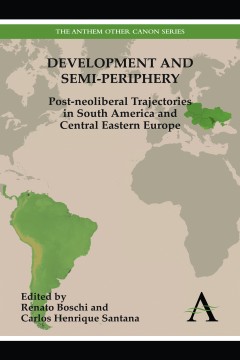Development and Semi-periphery
Post-neoliberal Trajectories in South America and Central Eastern Europe
Edited by Renato Boschi & Carlos Henrique Santana
- About This Book
- Reviews
- Author Information
- Series
- Table of Contents
- Links
- Podcasts
About This Book
This book is a collection of articles focusing on comparative analysis of the development trajectories in the semi-periphery countries of South America and Central and Eastern Europe. The book tries to approach the dilemmas of development in the semi-periphery as diversely as possible, always emphasising the variety of trajectories as a crucial factor. Therefore there are evaluations of the role of cognitive regimes produced by professional fields as elements of collective action coordination and as beacons that fix State-society relations. As opposed to the transitology studies that were prevalent in the 1990s, and that treated the neoliberal context in these two regions separately, the articles in this volume instead offer a new comparative analysis about the consequences of the neoliberal reforms and the new actors that deal with these results.
The book is concentrated on the experiences with market reforms and institutional legacies during the last twenty years. Central and Eastern Europe and South American countries have gone through a rapid restructuring of productive regimes in the process of integration with the global capitalist system. This volume discusses the variety of forms of state that have unfolded in different peripheral countries and their role in the social engineering of economic models and social policies, as well as to the impact of state capacities and ideas on the institutional innovations. These essays also compare the transformations in political culture, collective identities and contentious politics in both areas. The growing distance between the state and society, social disintegration and the concrete effects of market reforms (unemployment, informality, loss of rights) were closely related to a growing social mobilization as well as to a politicization of social and ethnic identities in South America. In Eastern Europe the institutional model of liberal democracy has been challenged on the one hand by the claims of social equality that derives from the communist legacy, and on the other hand by the question of political rights that has emerged within the context of the new wave of nationalisms and politicisation of ethnic identities.
Reviews
“Of the emerging economies, those of Latin America and Eastern Europe receive less attention than China and India. This important volume will contribute to changing this situation. From a global comparative perspective, it sheds light on economic development and on political and politico-cultural changes over the last twenty years, and offers discussion of theoretical issues.” —Dr Uwe Becker, University of Amsterdam
“This volume revives the debates in comparative political economy concerning East European and Latin American transformations. Much can be learned from the diverse experiences of peripherality, development, and the different patterns of insertion into the flows of global capitalism. Bringing together a wide range of disciplinary perspectives, the collection discusses the topics of macroeconomic transformations, state capacity and policies of development, the role of the elites and the diffusion of ideas, and cultural and identity politics.” —Dr Jan Drahokoupil, University of Mannheim
Author Information
Renato Boschi holds a PhD in political science from the University of Michigan, and is currently Full Professor in Political Science at the Institute of Social and Political Studies, IESP-UERJ.
Carlos Henrique Santana holds a PhD in political science from the Institute of Social and Political Studies, IESP-UERJ, was formerly Assistant Professor in Political Science at the Federal University of Rio de Janeiro (UFRJ), and is currently a researcher at the International Celso Furtado Center for Development Policies and at the NEIC-IESP.
Series
Anthem Other Canon Economics
Table of Contents
List of Tables and Figures; Introduction – Renato Boschi and Carlos Henrique Santana; PART I DEVELOPMENT, MACROECONOMIC POLICIES AND VARIETIES OF CAPITALISM; Chapter 1. Postsocialist States in the System of Global Capitalism: A Comparative Perspective – David Lane; Chapter 2. Politics and Development: Lessons from Latin America – Renato Boschi and Flavio Gaitán; Chapter 3. Managing the Faustian Bargain: Monetary Autonomy in the Pursuit of Development in Eastern Europe and Latin America – Joseph Nathan Cohen; Chapter 4. Development and Dependency, Developmentalism and Alternatives – José Maurício Domingues; PART II POLITICAL CULTURE, IDENTITY POLITICS AND POLITICAL CONTENTION; Chapter 5. Indigenous Movements in Bolivia, Ecuador and Peru – Xavier Albó; Chapter 6. Path Dependence versus Adaptation in Estonian Ethnopolitics – Raivo Vetik; Chapter 7. Integration Parliaments in Europe and Latin America: Explaining Variations – Juliana Erthal; PART III IDEAS AND THE ROLE OF ELITES AND ADVOCACY NETWORKS: TRANSLATING AND LEGITIMATING THE FRONTIERS OF INSTITUTIONAL REFORMS; Chapter 8. Marketing Professional Expertise by (Re)Inventing States: Professional Rivalries between Lawyers and Economists as Hegemonic Strategies in the International Market for the Reproduction of National State Elites – Yves Dezalay and Bryant Garth; Chapter 9. Identity, Policy Preferences and the Perception of the European Integration Process among the Hungarian Elites – György Lengyel and Borbála Göncz; Chapter 10. Critical Junctures, Institutional Legacies and Epistemic Communities: A Development Agenda in Brazil – Carlos Henrique Santana; PART IV ECONOMIC REFORMS, PUBLIC POLICIES AND DEVELOPMENT; Chapter 11. Development and Citizenship in the Semi-periphery: Reflecting on the Brazilian Experience – Krista Lillemets; Chapter 12. The Periphery Paradox in Innovation Policy: Latin America and Eastern Europe Compared – Rainer Kattel and Annalisa Primi; Chapter 13. The Lula Government and the Social Democratic Experience in Brazil – Fabiano Santos
Links
Stay Updated
Information
Latest Tweets



